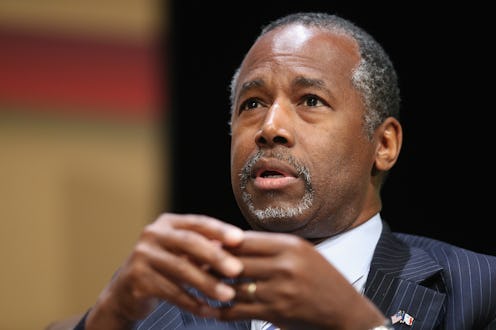News
Ben Carson Has Studied Fetal Tissues For Research
In recent weeks, Planned Parenthood has come under intense scrutiny, with presidential candidates on the right loudly vocalizing their criticisms of the health care organization after undercover (and heavily edited) videos were released that appeared to show a Planned Parenthood representative discussing the sale of fetal tissue. (The organization denies the videos show any evidence of wrongdoing and company president Cecile Richards called the videos a "smear campaign.") Presidential candidate Dr. Ben Carson has been especially outspoken in opposition to Planned Parenthood, abortion, and the use of fetal tissue in medical research. However, another doctor, Jen Gunter, published an essay on her personal blog on Wednesday, August 12 that alleges Ben Carson used fetal tissue for research purposes and that he co-published the findings in a 1992 study. Bustle reached out to Carson's campaign for comment on the study, but has not yet received a response.
The study in question is a 1992 paper entitled "Colloid Cysts of the Third Ventricle: Immunohistochemical Evidence for Nonneuroepithelial Differentiation," which was published by Carson and four of his colleagues. In her blog post, Gunter posted a screen-cap of the section on the paper that details the methods and materials used in the study, highlighting a portion that specifically deals with tissues used:
Human choroid plexus, ependyma, and nasal mucosa were obtained from two fetuses aborted at the ninth and 17th week of gestation.
The paper's abstract also mentions the use of fetal tissue and its relation to the study's findings, numerous times.
In light of the Planned Parenthood videos and the recently topical issue of using aborted fetal tissue for medical research, Carson has spoken out against abortion and Planned Parenthood's fetal tissue donation practice, telling Fox News' Megyn Kelly in July:
At 17 weeks, you’ve got a nice little nose and little fingers and hands and the heart’s beating. It can respond to environmental stimulus. How can you believe that that’s just a[n] irrelevant mass of cells? That’s what they want you to believe, when in fact it is a human being.
The published 1992 study notes not only that fetuses were used, but that in fact a 17-week fetus was used, the same time of gestation at which Carson stated that a fetus is a "human being" capable of responding "to environmental stimulus."
Carson defended the use of fetal tissue as a part of this 1992 study on Thursday, August 13, The Washington Post reported. Carson stated:
You have to look at the intent. To willfully ignore evidence that you have for some ideological reason is wrong. If you’re killing babies and taking the tissue, that’s a very different thing than taking a dead specimen and keeping a record of it.
In this statement, Carson appears to agree that fetal tissue is essential for medical research, saying it's wrong to "ignore evidence that you have for some ideological reason." This contradicts Carson's earlier comments to Fox News and Kelly where he stated there is "nothing that can't be done without fetal tissue." If aborted fetal tissues are not donated, they are disposed of as medical waste; whether or not they become medically useful "evidence" depends on if they are donated and thus able to be studied.
Carson appears to be drawing a confusingly vague and perhaps ultimately arbitrary line between his research and the research that results from donated aborted fetal tissue by insisting that Planned Parenthood's fetal tissue donation program is actually the profitable sale of "baby parts."
Planned Parenthood has repeatedly clarified that the organization does not harvest fetal tissue for profit, but is able to allow abortion patients the option to have their aborted fetal tissues donated for medical research, which many scientists say is invaluable to the advancement of treatment for various illnesses, including cancer and AIDS.
Image: National Institute of Health
